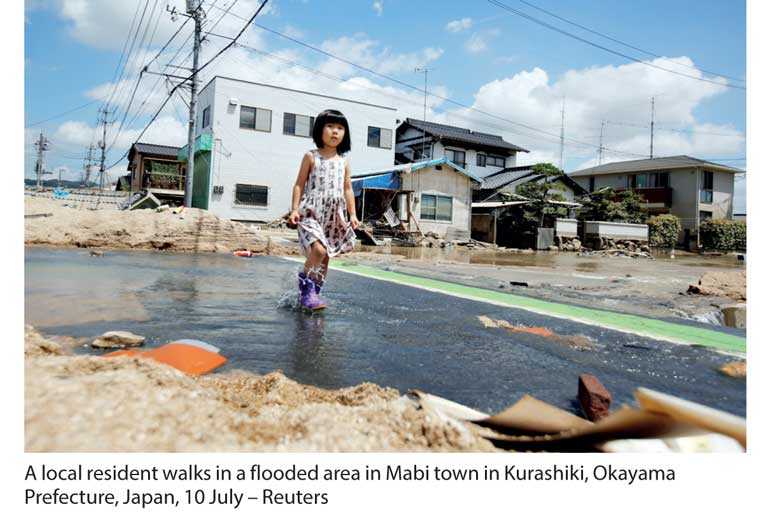Wednesday Feb 25, 2026
Wednesday Feb 25, 2026
Wednesday, 11 July 2018 00:00 - - {{hitsCtrl.values.hits}}
 KURASHIKI, Japan (Reuters): Japan struggled on Tuesday to restore utilities and bring relief to the victims of its worst floods in 36 years, facing health risks from broiling temperatures and a lack of water, while rescuers kept up an increasingly grim search for victims.
KURASHIKI, Japan (Reuters): Japan struggled on Tuesday to restore utilities and bring relief to the victims of its worst floods in 36 years, facing health risks from broiling temperatures and a lack of water, while rescuers kept up an increasingly grim search for victims.
Torrential rains unleashed floods and landslides in western Japan last week, killing 127 and prompting Prime Minister Shinzo Abe to cancel an overseas trip to cope with the disaster, which at one point forced several million from their homes.
Power supply has resumed to all but 3,500 customers, but more than 200,000 remain without water under scorching sun, with temperatures set to hit 33 C (91 F) in some of the hardest-hit areas, such as the city of Kurashiki.
“There have been requests for setting up air-conditioners due to rising temperatures above 30 degrees today, and at the same time we need to restore lifelines,” Finance Minister Taro Aso told reporters after a cabinet meeting.
Roads coated in dried mud in the Mabi district of Kurashiki threw up clouds of dust when rescue vehicles or cars drove by. Survivors recounted narrow escapes.
“It was close. If we had been five minutes later, we would not have made it,” said Yusuke Suwa, who fled by car with his wife early on Saturday when an evacuation order came after midnight.
“It was dark and we could not see clearly what was happening, although we knew water was running outside. We did not realize it was becoming such a big deal.”
A quarter of flood-prone Mabi, sandwiched between two rivers, was inundated after a levee crumbled under the force of last week’s torrents.
The death toll from the floods rose to at least 127, with 63 missing, public broadcaster NHK said.
The government has set aside 70 billion yen ($631 million) in infrastructure funds to respond to disasters, with 350 billion yen ($3.15 billion) in reserve, Aso said, adding that an extra budget would be considered if needed.
“When necessary amounts firm up ... we would consider an extra budget later on if these funds prove insufficient.”
Japan monitors weather conditions and issues warnings early, but its dense population means every bit of usable land, including potential flood plains, is built on in the mostly mountainous country, leaving it prone to disasters.
Some residents of Mabi had shrugged off the warnings, however, given the area’s history of floods.
“We had evacuation orders before and nothing happened, so I just thought this was going to be the same,” said Kenji Ishii, 57, who ignored an order and stayed in his home with his wife and son.
A military boat plucked them from the second floor of the house, where they had fled to escape the rising waters.
“When rescue boats started coming around, they could find people looking out from the window, but those who stayed inside the house were not visible to them,” Ishii added.
A new evacuation order went out on Tuesday in a part of Hiroshima prefecture, after a river blocked by debris overflowed its banks, affecting 23,000 people.